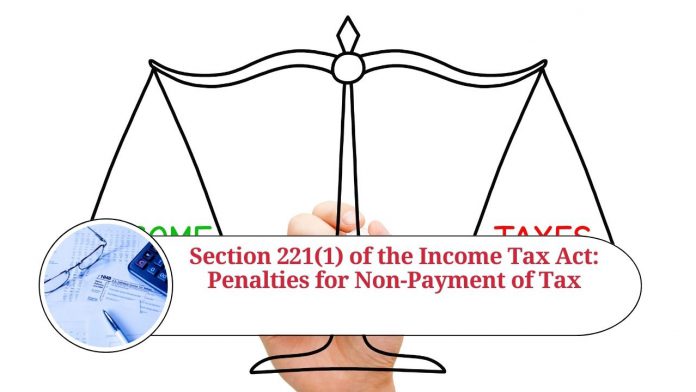Taxation is an essential aspect of any economy, as it provides the government with the necessary funds to meet its various obligations. In India, the Income Tax Act provides a framework for the collection and payment of income tax. Failure to pay tax or delay in payment can result in penalties under Section 221(1) of the Income Tax Act. In this blog, we will discuss this section and the implications of non-payment or delay in payment of tax.
What is Section 221(1)?
Section 221(1) of the Income Tax Act, 1961 states that if an individual or a company fails to pay the tax due, or part thereof, within the specified time, they shall be liable to pay a penalty. The penalty is calculated as a percentage of the amount of tax unpaid, and it accrues from the due date of payment until the date of payment.
The penalty is imposed in addition to the interest charged on the unpaid amount. The interest is charged at a rate of 1% per month or part of a month for the period of delay in payment. Therefore, non-payment or delay in payment of tax can result in substantial penalties and interest charges.
Who is Liable to Pay the Penalty?
The penalty under Section 221(1) of the Income Tax Act is applicable to all individuals and companies who fail to pay the tax due within the specified time. The penalty is levied irrespective of the nature of income, i.e., whether it is from salary, business, or capital gains.
The penalty is also applicable to cases where the taxpayer has made an incorrect estimate of tax liability, resulting in underpayment or non-payment of tax.
How is the Penalty Calculated?
The penalty under Section 221(1) of the Income Tax Act is calculated as a percentage of the tax amount unpaid. The penalty rate is 1% for every month or part of the month for which the tax remains unpaid.
For example, suppose Mr. A has a tax liability of Rs. 1,00,000 and fails to pay the tax within the due date of payment. In that case, he will be liable to pay a penalty of Rs. 1,000 per month or part of the month for which the tax remains unpaid, in addition to interest charged at a rate of 1% per month or part of the month.
It is important to note that the penalty cannot exceed the amount of tax unpaid. Therefore, if the tax amount unpaid is Rs. 1,00,000, the maximum penalty that can be charged is Rs. 1,00,000.
How to Avoid Penalties under Section 221(1)?
The easiest way to avoid penalties under Section 221(1) of the Income Tax Act is to pay the tax due within the specified time. The due date of payment depends on the type of taxpayer, and it is usually mentioned in the tax return form.
If you are unable to pay the tax due in full, you can opt for the Income Tax Department’s installment payment scheme. The scheme allows taxpayers to pay their tax liability in installments over a period of time.
In conclusion
non-payment or delay in payment of tax can result in substantial penalties and interest charges under Section 221(1) of the Income Tax Act. It is, therefore, important to pay the tax due within the specified time or opt for the installment payment scheme to avoid penalties. As a responsible citizen, it is our duty to pay our taxes on time and contribute to the development of the country.
Read more useful content:
- section 234e of income tax act
- section 286 of income tax act
- section 90a of income tax act
- section 40a(7) of income tax act
- section 226(3) of income tax act
- section 24 of income tax act
Frequently Asked Questions (FAQs)
Q: What is Section 221(1) of the Income Tax Act?
A: Section 221(1) of the Income Tax Act, 1961 states that if an individual or a company fails to pay the tax due, or part thereof, within the specified time, they shall be liable to pay a penalty.
Q: Who is liable to pay the penalty under Section 221(1) of the Income Tax Act?
A: The penalty under Section 221(1) of the Income Tax Act is applicable to all individuals and companies who fail to pay the tax due within the specified time.
Q: Is the penalty applicable only to income tax or all taxes?
A: The penalty under Section 221(1) of the Income Tax Act is applicable only to income tax.
Q: How is the penalty calculated under Section 221(1) of the Income Tax Act?
A: The penalty under Section 221(1) of the Income Tax Act is calculated as a percentage of the tax amount unpaid. The penalty rate is 1% for every month or part of the month for which the tax remains unpaid.
Q: Is interest charged along with the penalty under Section 221(1) of the Income Tax Act?
A: Yes, interest is charged on the unpaid amount at a rate of 1% per month or part of a month for the period of delay in payment, in addition to the penalty.
Q: What is the maximum penalty that can be charged under Section 221(1) of the Income Tax Act?
A: The penalty cannot exceed the amount of tax unpaid. Therefore, if the tax amount unpaid is Rs. 1,00,000, the maximum penalty that can be charged is Rs. 1,00,000.
Q: Can a taxpayer opt for an installment payment scheme to avoid penalties under Section 221(1) of the Income Tax Act?
A: Yes, taxpayers who are unable to pay the tax due in full can opt for the Income Tax Department’s installment payment scheme to avoid penalties.
Q: What is the due date of payment for income tax?
A: The due date of payment depends on the type of taxpayer, and it is usually mentioned in the tax return form.




















